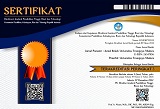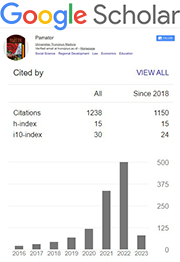The Influence of eWOM Purchase Intention with Trust Mediating Variables on MOP Beauty Product
Abstract
Keywords
Full Text:
PDFReferences
Arora, Lokesh, and Bhuvanesh Kumar Sharma, ‘Influence of Review Quality, Review Quantity and Review Credibility on Purchase Intention in the Context of High Involvement Products Evaluated by a Double-Blind Review System’, European Journal of Applied Business Management, Special Issue, 4.4 (2018), 25–40
Bhandari, Manu, and Shelly Rodgers, ‘What Does the Brand Say? Effects of Brand Feedback to Negative EWOM on Brand Trust and Purchase Intentions’, International Journal of Advertising, 37.1 (2018), 125–41
Erkan, Ismail, and Chris Evans, ‘The Influence of EWOM in Social Media on Consumers’ Purchase Intentions: An Extended Approach to Information Adoption’, Computers in Human Behavior, 61 (2016), 47–55
Faulkner, Paul, and Thomas Simpson, The Philosophy of Trust (Oxford University Press, 2017)
Handayani, Asih, PEMBELIAN SECARA ONLINE MELALUI LIFESTYLE PADA PENGGUNA E-COMMERCE SHOPEE DI SURAKARTA, 2022, X
Indrawati, Prily Calista Putri Yones, and Saravanan Muthaiyah, ‘EWOM via the TikTok Application and Its Influence on the Purchase Intention of Somethinc Products’, Asia Pacific Management Review, 28.2 (2023), 174–84
Khalid, I, ‘Kredibilitas Media Cetak Dan Media Online’, Journal of Physics: Conference Series, 9.1 (2019), 84–105
Khamitov, Mansur, Koushyar Rajavi, Der-Wei Huang, and Yuly Hong, ‘Consumer Trust: Meta-Analysis of 50 Years of Empirical Research’, Journal of Consumer Research, 2023
Kintradinata, Lita Liani, and Riski Taufik Hidayah, ‘Pengaruh Electronic Word of Mouth Melalui Aplikasi TikTok Terhadap Minat Beli Pada Produk Skintific’, Jurnal Ilmiah Manajemen Bisnis Dan Inovasi Universitas SAM Ratulangi (JMMBI UNSRAT), 10.2 (2023), 882–92
Leong, Choi Meng, Alexa Min Wei Loi, and Steve Woon, ‘The Influence of Social Media EWOM Information on Purchase Intention’, Journal of Marketing Analytics, 10.2 (2022), 145–57
Luo, Chuan, Xin (Robert) Luo, Yun Xu, Merrill Warkentin, and Choon Ling Sia, ‘Examining the Moderating Role of Sense of Membership in Online Review Evaluations’, Information & Management, 52.3 (2015), 305–16
Metzger, Miriam J, Andrew J Flanagin, and Lara Zwarun, ‘College Student Web Use, Perceptions of Information Credibility, and Verification Behavior’, Computers & Education, 41.3 (2003), 271–90
Mou, Jian, Dong-Hee Shin, and Jason F. Cohen, ‘Trust and Risk in Consumer Acceptance of E-Services’, Electronic Commerce Research, 17.2 (2017), 255–88
Noval, Themmy, Ira Brunchilda Hubner, and Innocentius Bernarto, ‘Ease Of Use Dan Trust Terhadap Purchase Intention Melalui Customer Satisfaction Pada Situs Web Tokopedia’, Jurnal Ecodemica, 4.2 (2020)
Oliveira, Tiago, Matilde Alhinho, Paulo Rita, and Gurpreet Dhillon, ‘Modelling and Testing Consumer Trust Dimensions in E-Commerce’, Computers in Human Behavior, 71 (2017), 153–64
Park, Tiwa, ‘How Information Acceptance Model Predicts Customer Loyalty?’, The Bottom Line, 33.1 (2020), 60–73
Perera, Charitha Harshani, Rajkishore Nayak, and Nguyen Van Thang Long, ‘The Impact of Electronic-Word-of Mouth on e-Loyalty and Consumers’ e-Purchase Decision Making Process: A Social Media Perspective’, International Journal of Trade, Economics and Finance, 10.4 (2019), 85–91
Rahmizal, Maizul, and Rido Yuvendri, ‘PENGARUH KEPERCAYAAN, KEMUDAHAN DAN KUALITAS INFORMASI TERHADAP KEPUTUSAN PEMBELIAN DARING DI APLIKASI SHOPEE PADA MAHASISWA DI KOTA PADANG’, JURNAL PUNDI, 4.3 (2021)
Salsabila, Rindi, ‘Ini Produk Kecantikan Paling Diburu Di Jakarta x Beauty 2023’, CNBC Indonesia, 2023
Santoso, Giovani, and Anna Triwijayati, ‘Gaya Pengambilan Keputusan Pembelian Pakaian Secara Online Pada Generasi Z Di Indonesia’, Jur. Ilm.Kel. & Kons., 2018, pp. 231–42
Sawlani, D K, Keputusan Pembelian Online, Kualitas Website, Keamanan Dan Kepercayaan (Edisi Pert) (Scopindo Media Pustaka, 2021)
Wahpiyudin, Cep Abdul Baasith, Raditya Kasih Mahanani, Ismie Leona Rahayu, and Megawati Simanjuntak, ‘Kredibilitas Review Konsumen Pada Transaksi Di E-Commerce: Sumber Informasi Dalam Keputusan Pembelian Online’, Policy Brief Pertanian, Kelautan Dan Biosains Tropika, 4.1 (2022)
Yousuf Bhat, Nazia, ‘The Influence of Electronic Word of Mouth (Ewom) on Consumers Purchase Intention: A Review and Analysis of the Existing Literature’, International Journal of Advances in Engineering and Management (IJAEM, 2.1 (2008), 97–107
Zhang, Kem Z.K., Christy M.K. Cheung, and Matthew K.O. Lee, ‘Examining the Moderating Effect of Inconsistent Reviews and Its Gender Differences on Consumers’ Online Shopping Decision’, International Journal of Information Management, 34.2 (2014), 89–98
DOI: https://doi.org/10.21107/pamator.v17i1.25266
Refbacks
- There are currently no refbacks.
Copyright (c) 2024 Gea Aprinda Santyadewi, Albari Albari

This work is licensed under a Creative Commons Attribution-ShareAlike 4.0 International License.
Jurnal Pamator : Jurnal Ilmiah Universitas Trunojoyo by Universitas Trunojoyo Madura is licensed under a Creative Commons Attribution-ShareAlike 4.0 International License.















.png)